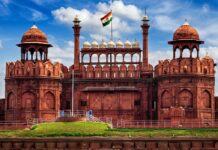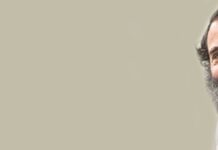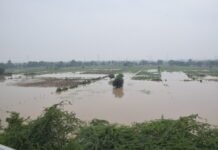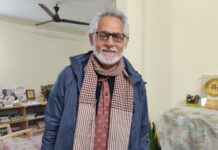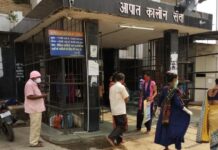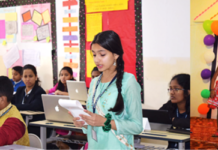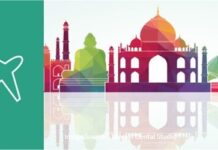At a time when social distancing to ward off the deadly coronavirus has become a norm, the two major religious groups in the country, Hindu and Muslim, have a reason to come closer to each. Together they can defeat this viral adversary which sees no religion, caste, creed, religion or region.
So contagious is the disease that even close relatives are scared of attending to the infected people. With over 2.5 lakh deaths reported from across the country so far Covid-19 is the deadliest infection ever. More than 36 lakh people are under treatment for the viral infection in all over the country.
Against this backdrop, Covid-19 is the most unlikely patron saint of love and brotherhood. But this is what the deadly disease has achieved – meeting of hearts and minds. In these testing times of cornavirus, he assumed the role of cupid, albeit in a horrifying way.
The pandemic did what saints have failed to do after years of meditation. It was bridging the barriers of cast, creed, region and religion. Leaving behind the scare of the pandemic, people came out to help those affected by the pandemic irrespective of their religious affiliation or any caste or ethnic consideration.
Last year during the Covid-induced lockdown, as the government the common man to fend for himself, men and women from among the common people belonging to different communities came to the rescue of the poor and the needy. These knights in shining armour operated in groups and delivered relief packages of both cooked food and uncooked food at the doorstep of the needy.
Migrant labourers had to leave cities and towns, where they worked, due to the sudden clamping of lockdown. As they trudged to their respective villages located in far-off lands hungry and disgust it was these Good Samaritans who provided them with food, water and other relief material on their way without any discrimination.
These aid groups were consisted of both Hindus and Muslims. But the role of Muslims in this noble mission came in for lot of praise.
The young Muslim men were admired not only for their generosity but also their large-heartedness. They carried out their relief mission at a time when their community was target of hatred. Leaving behind the bitterness of the hate crimes like social boycott, physical attacks and campaign of calumny against them, they dedicated themselves to the social service.
This time around, with the pandemic becoming deadlier and all the more contagious the risk of infection is enormous. But these knights in shining armour carried on with their task undeterred and, in some ways, went beyond their brief ferrying patients to the hospitals and transporting dead bodies to the crematoriums and burial grounds.
Their task did not end there. As casualties rose astronomically, the dead bodies started piling up. Many of the deceased Hindus were cremated by Muslim relief workers in accordance with Hindu rituals while Hindus gave the Muslim dead burial in accordance with Islamic rituals.
Two classic examples of interfaith unity came to light recently. These are:
As bodies of two women were mixed up in Bhopal’s Hamidia Hospital a Muslim family was handed the dead body of a Hindu woman by mistake while the body of their deceased woman went to the Hindu woman’s family. By the time the error was detected, the Hindu family had already cremated the body of the Muslim woman as per Hindu customs.
While both the parties took up the issue with administration, neither of them had any grouse against each other. This reflects the trust the two communities repose in each other.
In another case of which showcases solidarity between the two communities when trustee of a graveyard of Malad Malwani, Mumbai refused burial due to the stigma attached to the coronavirus relatives of the diseased took his body to a nearby crematorium and handed it over for cremation.
These finest examples of interfaith camaraderie have emerged at a time when assembly elections were being fought on communal lines. It goes to the credit of the pandemic that electorate in almost all states rejected divisive forces.
Forget men, even women are not legging behind. A Muslim woman was seen performing Hindu funeral rites at a crematorium with the permission from both Hindu and Muslim communities. The unprecedented death and mayhem caused by the coronavirus generated a rare feeling of empathy among the communities for each other never seen in the country before.
At a time when close family members and relations shy away from ensuring for the last rites of their loved ones, a group of seven people known as Bilaspur New Youth Welfare society (all Muslims) in district Jagtial in Telangana has arranged the funeral of hundreds of Hindus and Muslims in the past six months. The group is led by Muhammad Muneer (48), a plumber and an electrician from Korutla. They have taken this initiative after seeing that family members of diseased were not coming forward for fear of getting infected by the virus.
Similarly, Mehboob Ali, 42, and his wife Yakoob Bi who run Sahrudaya Home for Orphans and Aged in Warangal organised last rites of 10 dead bodies from different faiths. In one of the cases, Yakoob Bi performed the rites of Covid 19 bodies of Hindu community.
A Covid19 positive patient, Moghaliyah, died in Banswada hospital while under treatment. His family members refused to organise the last rites. Eventually, ambulance driver Shafi and Ali performed his last rites.
In Lucknow, Uttar Pradesh, a group of Muslim men while fasting during Ramadan cremated corona victims when their families left their bodies at hospitals. In some cases, senior citizens died during isolation at homes. Family members didn’t touch their corpses for fear of infection even as they were decomposing. These Muslim youths came forward to perform their funeral rites. The team of 22 led by one, Imdad Imam, o far organized sacrament of seven Hindus and 33 Muslims.
A video posted on the social media showed how a passer-by helped an ambulance driver lift the dead body of a Hindu corona victim while residents of a pre-dominantly Hindu society in Bhajanpura area of North-East Delhi refused to co-operate with the driver. When the driver asked the Good Samaritan his name, his Muslim identity came out. He was Dilshad from Rohini who had gone to Bhajanpura for some personal work.
The solidarity among different communities is not confined to funeral rites. As oxygen supply was in short supply in hospitals and patients started dying for want of oxygen various NGOs run by Hindus, Muslims, Sikhs and Christians came forward to distribute oxygen cylinders free of cost to the needy. Among the NGOs involved in this noble mission across the country are Liver Foundation, Ola, Give India, Khalsa Aid, Hemkunt Foundation, Distress Management Collective India. Besides, social activists and local youths also involved themselves in the free distribution oxygen cylinders.
In the wake of shortage of beds in hospitals, Delhi Sikh Gurdwara Management Committee (DSGMC) as also mosque committees and Islamic seminaries thrown open their doors for patients transforming their premises into Covid centres. This is perhaps the first time in the history places of worship turned into healthcare centres. The management of these religious shrines voluntarily involved in the service of the patients.
Sikh volunteers also took up the responsibility to deliver food to Covid-19 patients quarantined themselves at their houses. They launched a door-to-door langar (free food) seva. Sikh committees also served food to migrant labourers stranded in the cities due to lockdown.
Ayesha Raut, a Muslim woman in Maharashtra’s Kolhapur city, who works at Aster Adhar Hospital in the city, performed the last rites of a Covid-19 infected Hindu man, Sudhakar Vedak,81, whose close relatives could not come for the funeral as they had tested positive for corona virus. Ayesha distributed PPE kits among the people working in cemeteries and crematoriums during the month of Ramadan while Muslims distributed zakat and fitra largesse among the poor.
Disclaimer: We do undertake rigorous checks on content provided by contributors before publishing the same. If you come across some factual errors, kindly bring this into our notice and we shall review your objection and claim as per our policy and display correction credits and corrections on the article itself.
The opinion expressed in the article is of the writer. Writer is a freelance journalist/journalist based in Delhi

